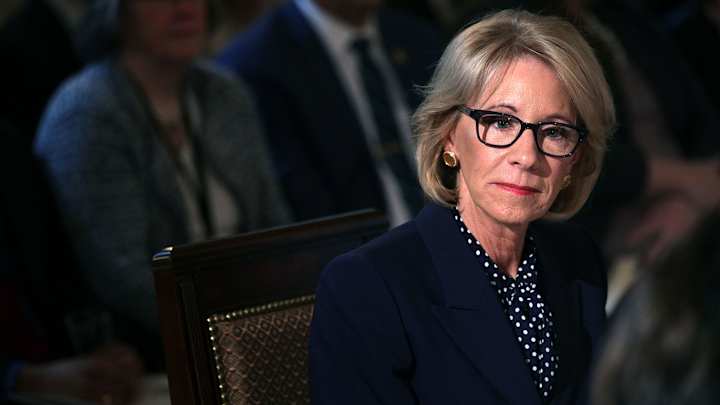Betsy DeVos Defends Proposal to Cut Federal Funding for Special Olympics

U.S. Secretary of Education Betsy DeVos defended $18 million in proposed cuts to the Special Olympics in an appearance before Congress on Tuesday.
According to the Free Press, DeVos suggested cutting $17.6 million from the program as part of the Trump administration's new proposed budget for the 2020 fiscal year.
"We had to make some difficult decisions with this budget," DeVos said Tuesday, adding she believes the program is better supported by "the philanthropic sector."
In @BetsyDeVosED’s budget, there are major cuts to programs like the Special Olympics. Sec. DeVos didn’t know the number of kids who would be hurt by that cut, so I made sure she now knows that 272,000 kids are seeing their support taken away. pic.twitter.com/6ZiOfDU4Ou
— Rep. Mark Pocan (@RepMarkPocan) March 26, 2019
The Special Olympics is a sports program designed to help children and adults with intellectual and physical disabilities. DeVos donated part of her salary last year to the Special Olympics, though she also proposed cutting $12.5 million of the program's federal funding.
DeVos also used her appearance before Congress on Tuesday to urge more support for charter schools.
"We are not doing our children any favors when we borrow from their future in order to invest in systems and policies that are not yielding better results," DeVos said in prepared testimony, according to the Free Press.
In a statement on Wednesday, DeVos said the Trump administration was dedicated to students with disabilities, claiming that “the media and some members of Congress have spun up falsehoods and fully misrepresented the facts.”
"The Special Olympics is not a federal program. It’s a private organization," DeVos said in the statement. "Because of its important work, it is able to raise more than $100 million every year. There are dozens of worthy nonprofits that support students and adults with disabilities that don’t get a dime of federal grant money. But given our current budget realities, the federal government cannot fund every worthy program, particularly ones that enjoy robust support from private donations.”
According to DeVos, the proposed budget includes a $13.2 billion request for the Individuals With Disabilities Education Act as well as $225.6 million for "competitively awarded grants to support teacher preparation, research and technical assistance to support students with disabilities."
Congress ultimately controls spending, so actual funding levels will likely differ substantially from President Trump's proposed budget.
